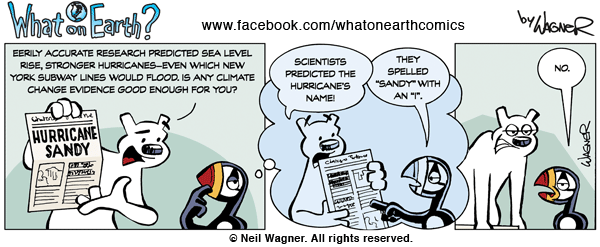
Damnit! I hate it when I'm right!
- NYPD Lieutenant John McClane
First off, for those not acquainted with the career of fictional police detective John McClane, check out the "Die Hard" movie franchise. Some of the best action movies of all times.
The reason a quote from Bruce Willis' cinematic alter ego leads off the blog portion of today's What on Earth is because I feel it represents a sentiment well-earned by climate scientists. They have spent years predicting the causes and consequences of a storm like Hurricane Sandy and the storm has now arrived.
Suppose you were contacted by your local police department ("John McClane calling!") and warned that they had solid evidence your house was being targeted for a burglary. Informants, local crime patterns, eye-witnesses... it all pointed to a potential break-in at your address.
Would you:
(A) Take steps to protect your home
(B) Do nothing but hope for the best
(C) Dismiss the police assessment as alarmist and ignore the whole thing
I'd say the first option would be a good course of action.
On a similar note, take a look at the following collection of eerily accurate predictions from scientists and other experts, as well as what they anticipate in the future. Ask yourself - should we take steps to protect our home?
- Earlier this year, Princeton University's Michael Oppenheimer determined that New York "is now highly vulnerable to extreme hurricane-surge flooding," and that destructive "once-in-a-century" floods would soon happen much more frequently.
- US Geological Survey, earlier this year: Seas along the East Coast from North Carolina to New England are rising three to four times faster than the global average.
- Last year, Columbia University's Klaus Jacobs' predictions about a Sandy-like storm included flooded-out subway lines that align almost identically to the aftermath of Sandy.
- A 2010 World Meteorological Organization report predicted: "fewer weak and moderate storms and more of the big damaging ones, which also are projected to be stronger due to warming."
- In 2007, Author Chris Mooney reported that scientists calculated a 1.5 foot sea level rise, combined with a Category 3 hurricane could submerge "the Rockaways, Coney Island, much of southern Brooklyn and Queens, portions of Long Island City, Astoria, Flushing Meadows-Corona Park, Queens, lower Manhattan, and eastern Staten Island from Great Kills Harbor north to the Verrazano Bridge."
- Nature Climate Change, February, 2012: "Climate change may double global losses from hurricanes."
- U.S. Global Change Research Program, 2005: "Based on a range of models, it is likely that future tropical cyclones (typhoons and hurricanes) will become more intense, with larger peak wind speeds and more heavy precipitation..."
- Natural Resources Defense Council and Rocky Mountain Climate Organization report earlier this year: "Similar scenarios [to August 2011's Hurricane Irene], and worse, are likely to happen in the years ahead if nothing is done to blunt climate change."
- Jerry Meehl, National Center for Atmospheric Research, 2011: "Greenhouse gases are the steroids of weather."
Now I have a prediction of my own. I predict scientists' dire climate predictions will unfortunately continue to prove frighteningly accurate.
Check out "What on Earth?" at Science Friday
Like "What on Earth?" on Facebook.
Become a Fan here at The Huffington Post.